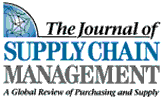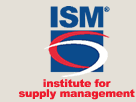Home > Publications > The Journal of Supply Chain Management

"One on One: An Interview with Keith Strange" By Roberta J. Duffy, Winter 2003, Vol. 39, No. 1, p. 2
One on One: An Interview with Keith Strange
The Journal of Supply Chain Management Copyright © February 2003, by the Institute of Supply Management, Inc.
Author(s):
Roberta J. Duffy
Interview by Roberta J. Duffy, editor of Inside Supply Management®
Keith Strange is vice president of supply management for the United States Postal Service (USPS), responsible for all Postal Service supply management activities, including sourcing, supplier interactions, and an inventory and distribution system for repair parts and operational supplies that supply more than 4 million orders annually. Mr. Strange began work with the Postal Service in 1973 as a purchasing specialist after serving three years in the U.S. Army. He holds a bachelor's degree in international studies from the University of South Carolina in Columbia, and a Master of Public Administration degree from the American University in Washington, D.C. He is a member of the Conference Board's Purchasing Leadership Council, the Institute for Supply Management™, and the Procurement Strategy Council. In 2002, he became a member of the CAPS Research Board of Trustees, which provides direction for CAPS' supply chain management research activities.
The Journal of Supply Chain Management: How did you get into the supply management field?
Keith Strange: It was somewhat by accident. I came out of the Army with the goal of working a few years and then going to law school. I was offered a position of purchasing specialist trainee for the Postal Service, and by the time I was accepted to law school, I had been offered a promotion and was finding the purchasing field interesting, challenging, and rewarding, so I decided to stay. I think it's a real credit to the growth of the profession to now see young people choosing it as a field in college and industry.
The Journal: What is your strategic role within the organization and to whom do you report?
Strange: I report to the chief financial officer, who in turn reports to the Postmaster General/ CEO. Our organization is divided into various portfolios (mail transportation, mail equipment, supplies, services, and major facilities) and operations, which manages our materials processes. Each is responsible for the strategic management of various categories of spend, the total of which is about $9 billion. In addition, our SCM strategies organization is responsible for driving supply chain management best practices, including metrics, knowledge management, and policies related to buying and supplying. We also have a supply management infrastructure organization concerned with people, policies, and data.
The Journal: What are the challenges unique to your organization or industry?
Strange: The Postal Service is unique — being a government agency but having a business charter to provide universal service and operate on our own revenues. Unlike most government agencies, we do have intense competition, from like service providers, as well as alternative technologies such as the Internet. So we have the same challenges as a private company, but with some extra governmental restrictions. For example, an independent third party, the Postal Rate Commission, reviews our pricing. Like many other organizations, we've been affected by the slowdown in the economy. We saw the deepest mail-volume drop in the last year since the Great Depression. And our transportation network was severely impacted by 9/11, in terms of the airlines' security restrictions. Furthermore, the anthrax incidents directly affected our operations. So, it's certainly been a unique mixture of challenges this year.
The Journal: How is supply management helping to resolve these challenges?
Strange: Our biggest contribution is to provide effective support for USPS's strategic programs and meet targets for supply chain cost reductions each year. Our goal last year was to reduce costs by $200 million and we ended up, conservatively measured by our controller, saving $240 million, in spite of such a tough year. That's a success that's been important in establishing credibility for supply chain management as a USPS strategy.
The Journal: What have been supply management's biggest successes at the United States Postal Service?
Strange: One key recent success was in our reaction to the anthrax incidents this year. We had to respond quickly, as lives were at stake and supply management was involved with everything from environmental testing, decontamination contracts, and safety gear to working with engineers to find solutions with new technologies. I was extremely proud of our organization's response and the teamwork that was involved with key internal clients, such as engineering and human resources. The other successes I have already mentioned — great support for our strategic programs and supply chain cost reductions.
The Journal: What is your vision for supply management at the Postal Service?
Strange: We continue to focus on delivering on expectations — and those expectations are growing. We've been working the last few years on supply chain management and have made a sweeping change in business process and structure. In fact, it's been the most dramatic change since 1970. Our goal has been to align structure and processes with strategies. We have a vision of achieving excellence in strategic impact, supply management processes, technology, and, most importantly, the skills of our people.
The Journal: What is the Postal Service doing in the area of e-commerce or using e-business tools?
Strange: Our primary goal in terms of e-business is to take out administrative costs. We have a team called Business Solutions and they are involved with applying technology solutions for our practices. We have also made use of electronic reverse auctions and we do have a catalog ordering system for strategically sourced supplier agreements. It has 30,000 users and is still growing. We do realize that with a user base that size, you can't just encourage e-use — you really have to drive it and we hope to do more in that regard.
The Journal: What skills and capabilities do you seek out in individuals when hiring or recruiting?
Strange: Good judgment and the ability to work with other people. There are other general business skills and supply management skills, but we've had a shift in thinking. When we did our restructure, we did a complete competency assessment, using ISM courses to address any gaps. And the shift was to realize you can train people in supply management skills, but it's hard to build, for example, judgment. So, we've come to value general business skills and capabilities in our talent pool more than specific experience.
The Journal: What do you see in the future for supply management at the Postal Service?
Strange: I've seen supply management of the Postal Service change dramatically. It evolved from a very transaction-focused, almost control organization to more of a service function. And it's building rapidly into a strategic supply chain management asset. But, despite all this progress, I don't think we've become as broad of a partner as we can be. We're going to work on strengthening our people and changing our culture so that we're looked at as a strategic partner throughout the organization. Thus far, our progress has gotten the attention and great support of the CFO and the Postmaster General/CEO. Five years ago, supply management wasn't included in the Postal Service's strategic thinking. Now, we play a key role in it.
-
About ISM
- Overview of ISM
- Media Room
- ISM Board of Directors
- National Officers Directory
- Affiliate Officers Directory
- ISM Affiliate Web Sites
- ISM Group and Forum Web Sites
- Frequently Asked Questions
- Chair's Corner
- ISM Annual Reports
- J. Shipman Gold Medal Award
- ISM R. Gene Richter Awards
- Supply Management Month
- Association Governance
- ISM Ethical Principles and Standards
- Activity Calendar
- Principles of Social Responsibility
- Membership
-
Members Only
- InfoCenter
-
Member Information & Online Tools
- ISM Glossary of Key Supply Management Terms
- Access to CIPS Members Only Content
- ISM Tool Kit
- ISM Resource Guides
- ContractWare®Net and eTool Agreements
- Address Update Form
- Activity Calendar
- Affiliate Websites
- Group & Forum Websites
- Member-Get-a-Member Campaign
- ISM Principles and Standards of Ethical Supply Management Conduct
- ISM Group/Forum Enrollment Information
- Job Descriptions
- The Business Source
- Propurchaser.com
- Affiliate Resources
- Career Center
-
Affiliate, Groups & Forums
- Group/Forum Enrollment Information
- Group/Forum Enrollment Form
- Groups & Forums Brochure and Flyer
- Group & Forum Case Studies
- Groups & Forums Promotion
- Spotlight on Groups and Forums
- Group and Forum Officers
- Affiliate Web Sites
- Group & Forum Web Sites
- Affiliate Officers
- National Officers
- Member-Get-a-Member Campaign information
- Sign up for ISM's Groups and Forums Discussion List Servs
- Search for Speakers
- Discussion Forums
-
Additional Resources
- ISM Resource Guides
- Bid Specifications Database
- Purchasing/Supply Management Periodicals
- Other Web Resources
- Practix - A quarterly Best Practices publication
- ISM's Principles and Standards of Ethical Supply Management Conduct
- Associations/Organizations Useful to Purchasing/Supply Management Professionals
- CIPS Study
- Search Articles
- CIPS Members Only Content
- Ethics and Social Responsibility
-
Education - Seminars, Conferences
- Conferences
- Seminars
- Speaking Opportunities
- Speakers Directory
- Scholastic Opportunities
- Online Courses — Knowledge Center
-
Onsite & Virtual Education Programs
- Create Value That Starts Within Your Organization
- Training That Fits Your Organization
- Programs That Get Results
- Delivery Solutions and Packaged Programs
- Course Topics and Outlines
- Your Dedicated Program Managers
- About ISM Instructors
- Request for Product Information Packet
- P-Strat Purchasing Simulation Course
- Supply Management FAQs for HR Professionals
- Glossary of Key Supply Mgmt Terms
- ISM Resource Guides
- ISM Tool Kit
- Advertising/Exhibiting Opportunities
- Products
- Publications
-
Professional Credentials
- Frequently Asked Questions
-
Certified Purchasing Manager (C.P.M.)
- C.P.M. Frequently Asked Questions (FAQs)
- C.P.M. Recertification FAQs
- How to Get Started on Your C.P.M. Designation
- C.P.M. Exam Registration Brochure (Download)
- C.P.M. Exam Information
- Register for the C.P.M. Exams Online
- Exam Specifications
- Study Materials for C.P.M. Exam
- Distribution of Questions Within the C.P.M. Exam
- C.P.M. Program Requirements
- C.P.M. Statement of Use
-
Certified Professional in Supply Mgmt
- Learn More About the Certified Professional in Supply Management (CPSM)
- CPSM Program FAQs
- CPSM Requalification FAQs
- Receive Email Updates About the Certified Professional in Supply Mgmt (CPSM)
- The CPSM will Prepare Supply's Future Leadership
- ISM’s Certification Market Study Supports New Qualification
- Accredited Purchasing Practitioner (A.P.P.)
- Certification Forms
- Credentials Discussion Forum
- Credentials Verification
-
Additional Program Information
- C.P.M. & A.P.P. Review Courses in ISM's Knowledge Center
- C.P.M. Onsite Testing and Review
- C.P.M. & A.P.P. Review Instructor Information
- C.P.M. & A.P.P. Program Overview - Powerpoint Presentation
- C.P.M. Exam Information
- C.P.M. & A.P.P. Study Materials
- International Certification Contacts
- Professional Development Scenarios
- Request a CEH Program Number
- Supply Line 2055: Certification Update
- Sign-up for Supply Line 2055: Certification Update
- How to Get Started on Your C.P.M. Designation
- ISM’s Certification Market Study Supports New Qualification
- The CPSM will Prepare Supply's Future Leadership
- International Certification Contacts
- Supply Line 2055: Certification Update
-
ISM Report on Business®
- Latest Manufacturing ROB
- Latest Non-Manufacturing ROB
- Reports on Business Overview
- Semiannual Reports
- Seasonal Adjustments
- Manufacturing Data
- Non-Manufacturing Data
- ROB Graphical Data
- Regional Business Survey Data
- How to Respond to ROB
- ROB Online Infokit
- JPMorgan Global PMI Reports
- Other Economic Information
- ROB Release Dates
- ROB Frequently Asked Questions
- ISM/Forrester Research Report
-
Career Center
- Your Profile
- Register for the Career Center
- Job Seekers
- Employers' Corner
-
More Career Resources
- ISM Affiliates that Offer Employment Services
- Job Descriptions
- Job Hunting Sites on the Web
- Job Hunting Sites for Specific Regional Areas
- Job Hunting Sites with Tools Such as Resume Writing Advice
- Careers In Supply Management
- Resources on Relocating
- Salary/Career-Building Resources
- Schools Offering Purchasing/Supply Management Courses
- Scholastic Opportunities
- Frequently Asked Questions
- CAPS Research
- Tools





